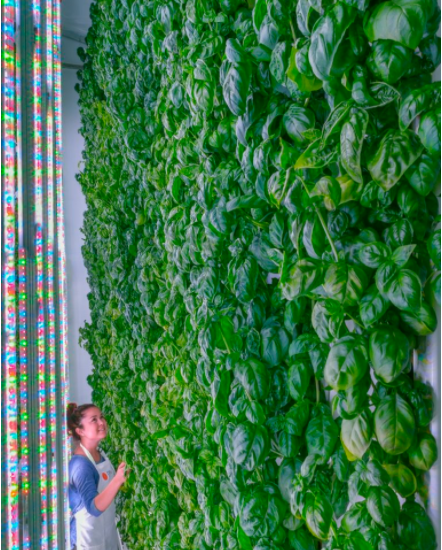Amazon CEO, Jeff Bezos, is back at being the world’s richest person, thanks to his impeccable leadership which has made Amazon the most valuable e-commerce company. But he also seems to have interest in agriculture and has invested in an agro firm which grows plants in a unique way i.e, without soil and natural light.
Plenty, the agro-tech company backed by Jeff Bezos, has a 100,000 square-foot facility where plants, preferably fruits and veggies, of “backyard quality” are produced for consumers in Seattle and Vancouver, B.C organically on LED-illuminated pillars through a technique called ‘indoor vertical farming’, which does not require soil, pesticides, and even sunlight.
How does this system work?
Plenty grows plants on LED-lit 20-foot-tall towers inside a former electronics distribution center which is a climate-controlled facility. It's a type of agriculture in which food grows on hanging modules in a climate-controlled, indoor facility. The process allows certain types of produce to be grown year-round in small spaces.It does not use pesticides, herbicides, synthetic fertilizers, or Genetically Modified Organisms (GMO). The system uses thousands of infrared cameras and sensors to collect data in the farms, which is then analyzed using machine learning to optimize how plants grow.
LED-lit 20-foot-tall towers
In the past, vertical farming investments haven’t panned out — Local Garden Vancouver, a similar crop-yielding greenhouse concept, declared bankruptcy a few years ago and other startups in the space have struggled over the years.
The thing that makes Plenty system different from previous attempts that rather than growing horizontal plants stacked above each other, Plenty grows its crops vertically with the plants growing outward instead of up. Although the company hasn’t revealed much about its methods, Plenty says it plans to use machine learning and climate creation technology without having to genetically modify its seeds.
Output
Plenty said its technology can achieve yields of up to 350 times greater than traditional agriculture while using 1 percent of the water (cutting water usage 99%) and barely any land compared to conventional methods. Moreover, they said that they can also grow plants — up to 300 variants of produce — year-round, regardless of season, which helps increase efficiency.
Variety of Plants grown at Plenty Farm
Since such farms can be established at any desired place near cities, as these don't require land area for growing plants etc, therefore such proximity to cities also means that produce doesn’t sit in trucks for days or weeks before ultimately arriving on your kitchen.
As per the statement fresh produce will start shipping to a few restaurants initially in mid-2018, and then to other buyers that will be announced at a later date. It also plans to open more farms across the country and eventually around the world.
Plenty aims to offer its organic produce at the same rate as those available in stores and plans to further bring the down the cost in future by automating the entire agricultural process.
The current activities will grow 4.5 million pounds of greens annually, which is enough to feed around 183,600 people.
Plenty cites studies showing that nutrition can be depleted up to 50 percent while produce is in transit. The company says its model of growing local and getting the produce to consumers within hours of harvesting results in the most nutrient-dense product possible.
Top 5 Amazing Facts about Indoor Farming
- Plenty, which has raised $238 million to date, is not the first company to attempt to build a business around indoor farming. Local Garden Vancouver, a similar crop-yielding greenhouse concept, declared bankruptcy a few years ago and other startups in the space have struggled over the years. _ Source: Geekwire
- Investors are bullish about the company’s potential. Backers of Plenty’s $200 million round in July included SoftBank (via its Vision Fund); Alphabet Chairman Eric Schmidt (through Innovation Endeavors); Amazon founder Jeff Bezos (through Bezos Expeditions); DCM Ventures; Data Collective; Finistere Ventures; and Louis Bacon. _ Source: Geekwire
- Plenty announced yesterday that it raised $200 million in Series B funding in what the company calls the largest agricultural technology investment of all time. This is a huge jump from the $24.5 million Plenty raised in 2016.
- Plenty CEO Matt Barnard founded the startup in 2014 with Nate Storey and Nate Mazonson, the company has expanded rapidly. It acquired Bright Agrotech, a vertical farming technology startup, last month and has grown to 100 employees.
- The new Seattle-based farm will grow leafy greens and herbs first, but will later expand to fruits, including strawberries, tomatoes, and watermelons. Barnard said that Plenty's strawberries will be smaller, less pulpy, and higher in sugar and acidity levels than the ones most consumers are used to. _ Source: Business Insider







No comments:
Post a Comment
Note: only a member of this blog may post a comment.